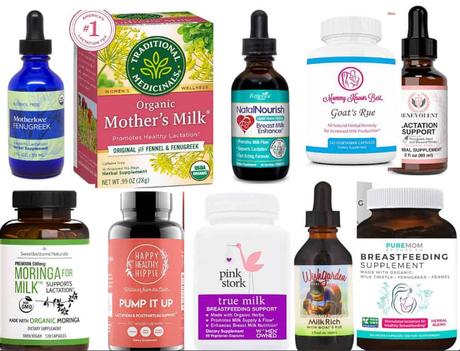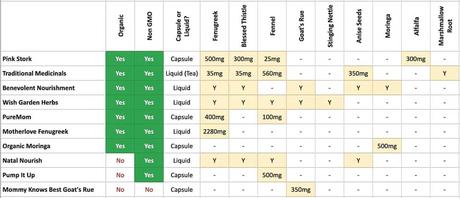This post may contain affiliate links. Please read my disclosure.
Are you a new mom in search of the best lactation supplements? This guide will help you learn what to look for and what to avoid when making a purchase, and outlines my list of the top 10 best lactation supplements available today. You'll also find out when the best time is to start taking lactation supplements and a few other ways to increase your milk supply.
Becoming a parent is an amazing, transformative experience - filled with a spectrum of emotions, ups and downs. And any new mom knows, there are a ton of decisions thrown at you when you first become a parent. Breastfeeding or bottle feeding? Organic or not-organic? Sleep-training or co-sleeping?
One of the biggest decisions new moms can face is when it comes to feeding. There's a lot to get used to, as well as potential hiccups that are hard to anticipate ahead of time. There is some evidence to suggest that breast milk can help with cognitive development and that it can boost immunity, but there are a whole host of other studies that show that breastfeeding doesn't have to be exclusive for babies to reap the benefits, and that the difference between the long term health of breastfed and formula fed babies is negligible. This is all to say, the decision on whether or not to breastfeed should be entirely up to you.
My opinion is that "FED" is best, and that a happy, healthy baby and mom is all that matters. If you have chosen to breastfeed, you might be wondering how to boost your milk supply - especially if you have an inadequate supply, want to build up milk to freeze/store, or you have a very hungry baby! Luckily, there are some easy, natural and safe ways to supplement lactation and boost your milk production. But knowing which methods or products to use can be tricky. Not only do these options need to be effective, but they also need to be safe.
That's where this guide will come in handy. I'll go over what to look for and what to avoid in lactation supplements, the top 10 lactation supplements on the market today, and I'll cover some other important information about when to start taking supplements and other ways to boost your milk supply.

10 Best Lactation Supplements for Nursing Moms
What should you look for when choosing the best lactation supplement for you and your baby?
There are many considerations when picking a supplement to increase your milk supply. Some of the general guidelines I recommend following are:
- Choosing an organic, non-GMO supplement
- Choosing a supplement free of dairy, soy and major allergens
- No artificial ingredients or fillers added
- Determining whether fenugreek is a good option for you (if you have had sensitivity to it in the past, or you notice digestive discomfort for you or your baby after taking it, you'll want to switch to a fenugreek free option).
When trying to choose a lactation supplement for you and your baby, there are a few ingredients you should always avoid. These include:
- Heavy metals
- Artificial sweeteners
- Added sugars
- Artificial flavors and colors
- Cannabidiol (CBD)
- Essential oils
- GMOs
- Preservatives and fillers

How do lactation supplements work?
Lactation supplements work because they are packed with galactagogues. Galactagogues are typically substances (foods, herbs, etc.) that can help a breastfeeding mother increase her milk supply. Lactation supplements contain high doses of galactagogues, so when taken consistently they can help boost milk production for nursing moms.
What Herbs Help Increase Your Milk Supply?
- Fenugreek: The most common herb for increasing milk supply. 5400 - 7300 mg/day is recommended to help increase breast milk supply. The most common side effect is a maple-syrup like smell in your sweat or urine, and some moms complain of digestive discomfort (both of these side effects resolve when the dosage is reduced)
- Blessed Thistle: Works well when paired with fenugreek. Fenugreek and blessed thistle are often cited as the most effective for increasing lactation support.
- Fennel: Commonly used with other herbs. Can help improve the let down effect.
- Goat's Rue: Related to fenugreek but doesn't have the maple syrup smell. Note: the fresh leaves are toxic, but the dried leaves (which is what's in the supplements I recommend) are safe for use.
- Stinging Nettle: High in iron, very nutritious and thought to help stimulate breastmilk production after giving birth.
- Anise Seeds: Known for its licorice taste, widely considered a galactagogue.
- Moringa: Has multiple benefits including nourishing skin & hair, supporting the liver, digestive support - and has been used in many countries to help stimulate breastmilk production.
- Alfalfa: May stimulate the release of prolactin, a hormone that helps moms produce breastmilk.
- Marshmallow Root: Provides skin & digestive support and may also reduce inflammation (so can counteract side effects from other herbs).
- Herbs like milk thistle, coriander, red raspberry leaf, etc. are often included in lactation supplements but don't have as direct ties to boosting milk supply (but they are beneficial in other ways like helping to balance hormones or providing liver support)
Herbal remedies have been used for centuries to treat all sorts of medical issues. But not all herbs are created equal. Some have virtually no effect at all, while others may work due to the placebo effect. Still others may have a notable impact on milk supply. Some of the best herbs that help increase milk supply include:
Keep in mind that nursing moms should actually avoid certain herbs. Parsley, peppermint, sage, oregano, thyme, sorrel, and a number of other herbs have been reported to decrease milk supply. In fact, these herbs may be recommended when moms are dealing with an over-supply of milk or when a baby is being weaned.
When Should You Start Taking Lactation Supplements?
Many new moms may be concerned about the amount of milk they're producing, especially right after birth. However, it's essential to note that mature milk production doesn't usually occur until 30 to 40 hours after delivering the placenta, sometimes longer if you've had a c-section. It's recommended that new moms wait to begin taking lactation supplements until their bodies have naturally adjusted to these needs.
In general, it's a good idea to refrain from taking lactation supplements for at least five days after delivery. At that point, you may want to consult a lactation consultant or your healthcare provider to determine whether lactation supplements may be necessary. Mothers who have experienced low milk supply with previous babies might want to talk to these aforementioned professionals prior to delivery to develop a potential breastfeeding plan.
Are lactation supplements safe?
Typically yes, they are safe. However, it's important to remember that supplements are not regulated by the FDA. In other words, there's no definitive standard for how much of an ingredient a lactation supplement product might contain. Moreover, some mothers may experience major improvements after taking a given supplement while others may have adverse reactions (or no reaction at all) to the same supplement. It's a good idea to consult a doctor or lactation specialist before trying any supplements at all.
What Else Can You Do To Increase Your Milk Supply Quickly?
Taking lactation supplements can help many moms to increase their milk supply, but supplements aren't the only option. More efficient milk removal and more frequent nursing can help, as can "switch nursing," pumping, and avoiding pacifiers or other food sources (like solids and formulas). You may even want to adjust your sleeping position to promote milk production. It's also vital for new moms to rest, eat well, and stay hydrated - as much as is possible, anyway!
10 Best Lactation Supplements, With Key Ingredients Highlighted

It's hard to pick just one lactation supplement that's heads and tails above the rest, since different herbs will work well for different moms. But in the chart below, I did rank the supplements from most beneficial to less beneficial based on: 1) Organic ingredients 2) Variety of herbs included 3) Potency of herbs included.
There's no question that being a parent is one of the most rewarding and challenging jobs you'll ever have, and given that 3.85 million babies are born annually in the U.S., you are certainly not alone in the adventure! With these tips in mind, you'll be well on your way to finding a lactation supplement method that will work for you.

